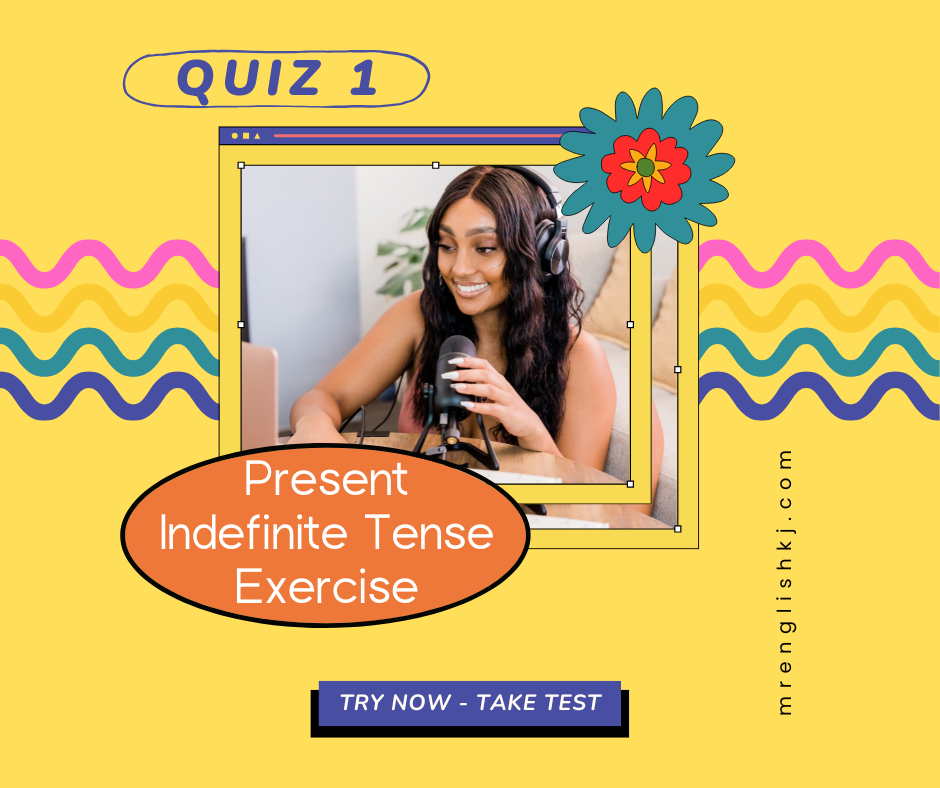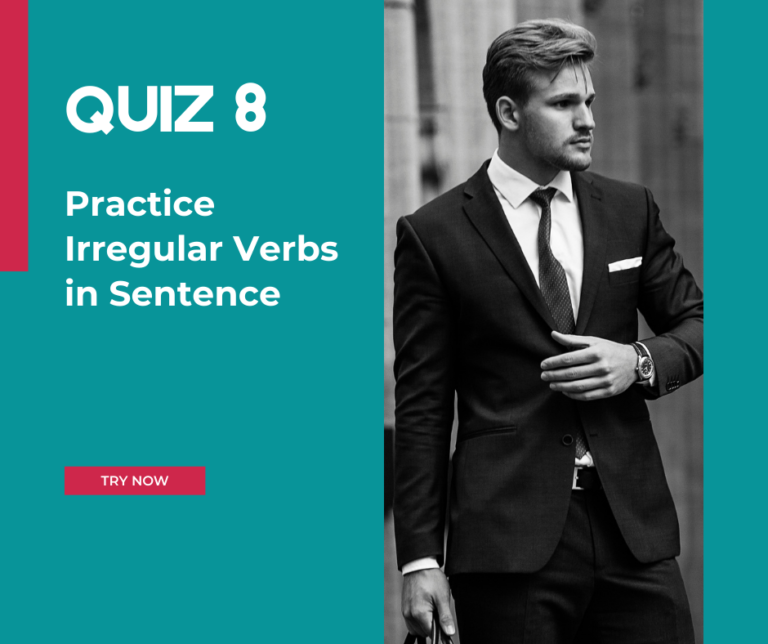
Present Indefinite Exercise 1 — Basic Present Simple Quiz
Welcome to Present Indefinite — Exercise 1, a short and friendly quiz for beginners. This practice set focuses on the Present Indefinite (also called Simple Present) tense — how we form it and when to use it. Each question has four choices and a full explanation so you learn not only the right answer but why it’s right. This is the first exercise in a series (Exercise 1, 2, 3 …) designed for steady improvement.
Short definition: Present Indefinite (Simple Present)
The Present Indefinite (Simple Present) describes habits, general truths, repeated actions, scheduled events, and states.
- Formation: base verb, verb 1st form, for I/you/we/they (e.g., I walk, they eat).
- Third person singular (he/she/it): add -s or -es on base verb (e.g., he walks, she goes).
- Use with adverbs of frequency: always, usually, often, sometimes, never.
- To learn more about Present Indefinite Tense – Visit Here
Quiz Instructions
- Read each question and choose the best answer out of four given options.
- On top, header section of the quiz, you will see the “title of the quiz,’ ‘spending-time,’ ‘value of question in points,’ and ‘number of questions.”
- Below on footer, you will see Full Screen mode. As the name suggests, it covers the whole screen. It will save a lot of your time attempting the quiz.
- You can zoom the images given in the questions.
- After submitting the quiz, you can see your score and compare with other users.
- The Full Leaderboard link will take you to a page, where you can see all users attempts.
- Below the quiz box, there are explanation of each options. You can study and try again.
- Best of Luck!
Quiz Question, Answer and Explanation
Note: Do remember in the quiz box above, the questions and options will shuffle, so they won’t have the same sequence like 1, 2, 3, or A, B, C as below.
1. He ______ to school every day.
A) go
B) goes
C) is going
D) went
Correct: B) goes
B correct — third person singular habit uses goes.
A incorrect — go is base form, not for he in simple present.
C incorrect — is going is present continuous (action now), not habitual.
D incorrect — went is past tense.
2. They __ coffee in the morning.
A) drinks
B) drink
C) is drinking
D) drank
Correct: B) drink
B correct — plural subject takes base verb drink for habitual action.
A incorrect — drinks is third person singular, not for they.
C incorrect — present continuous implies action happening now.
D incorrect — past tense.
3. My mother __ very well.
A) cooks
B) cooking
C) cook
D) cooked
Correct: A) cooks
A correct — mother (she) + third person singular cooks.
B incorrect — cooking is a gerund/present participle, not simple present finite verb.
C incorrect — cook is base form; wrong for she.
D incorrect — past tense.
4. You __ English very well.
A) speaks
B) speak
C) speaking
D) spoke
Correct: B) speak
B correct — you uses base verb speak.
A incorrect — speaks is for he/she/it.
C incorrect — speaking is not finite simple present.
D incorrect — past tense.
5. She __ to music every evening.
A) listen
B) listens
C) is listen
D) listened
Correct: B) listens
B correct — third person singular needs -s: listens.
A incorrect — listen is base form.
C incorrect — is listen is ungrammatical (would need is listening).
D incorrect — past tense.
6. Water ______ at 100°C.
A) boil
B) boils
C) is boiling
D) boiled
Correct: B) boils
B correct — general truth uses simple present third person singular boils.
A incorrect — base form without does/they is wrong for third person.
C incorrect — present continuous implies happening right now.
D incorrect — past tense.
7. I usually __ lunch at 1 PM.
A) have
B) has
C) having
D) had
Correct: A) have
A correct — I takes base verb have for habitual action.
B incorrect — has is third person singular.
C incorrect — having not finite.
D incorrect — past tense.
8. The train __ at 9 o’clock every night.
A) leave
B) leaves
C) is leaving
D) left
Correct: B) leaves
B correct — schedule (timetable) uses simple present with third person leaves.
A incorrect — base form wrong for ‘the train’.
C incorrect — present continuous would suggest a specific ongoing action.
D incorrect — past tense.
9. They ______ the newspaper every day.
A) reads
B) read
C) reading
D) is read
Correct: B) read (pronounced /riːd/)
B correct — plural subject uses base verb read.
A incorrect — reads is third person singular.
C incorrect — reading is not simple present finite verb.
D incorrect — is read changes voice and is not typical for habitual action.
10. Mark ______ to work by bike.
A) goes
B) go
C) is goes
D) gone
Correct: A) goes
A correct — Mark (he) + third person singular goes for habitual action.
B incorrect — go is base form.
C incorrect — ungrammatical.
D incorrect — past participle, not present simple.


